Managing Across Borders: Outsourcing, Advantages, and Disadvantages
VerifiedAdded on 2022/09/18
|8
|1689
|25
Essay
AI Summary
This essay provides a comprehensive analysis of outsourcing within the context of international business, highlighting its increasing significance in today's globalized environment. It begins with an executive summary that introduces outsourcing and the importance of third-party vendors. The essay then delves into the advantages and disadvantages of outsourcing, exploring how it can benefit companies through cost savings, access to expertise, and focus on core competencies, while also addressing potential drawbacks such as data security risks, loss of control, and communication challenges. The essay examines the role of globalization in driving outsourcing strategies and the factors influencing outsourcing decisions, such as labor costs and the availability of specialized skills. The essay concludes by summarizing the key points and emphasizing the importance of strategic outsourcing decisions for business success. The paper includes a list of references used in the research.

MANAGING ACROSS BORDERS
Paraphrase This Document
Need a fresh take? Get an instant paraphrase of this document with our AI Paraphraser
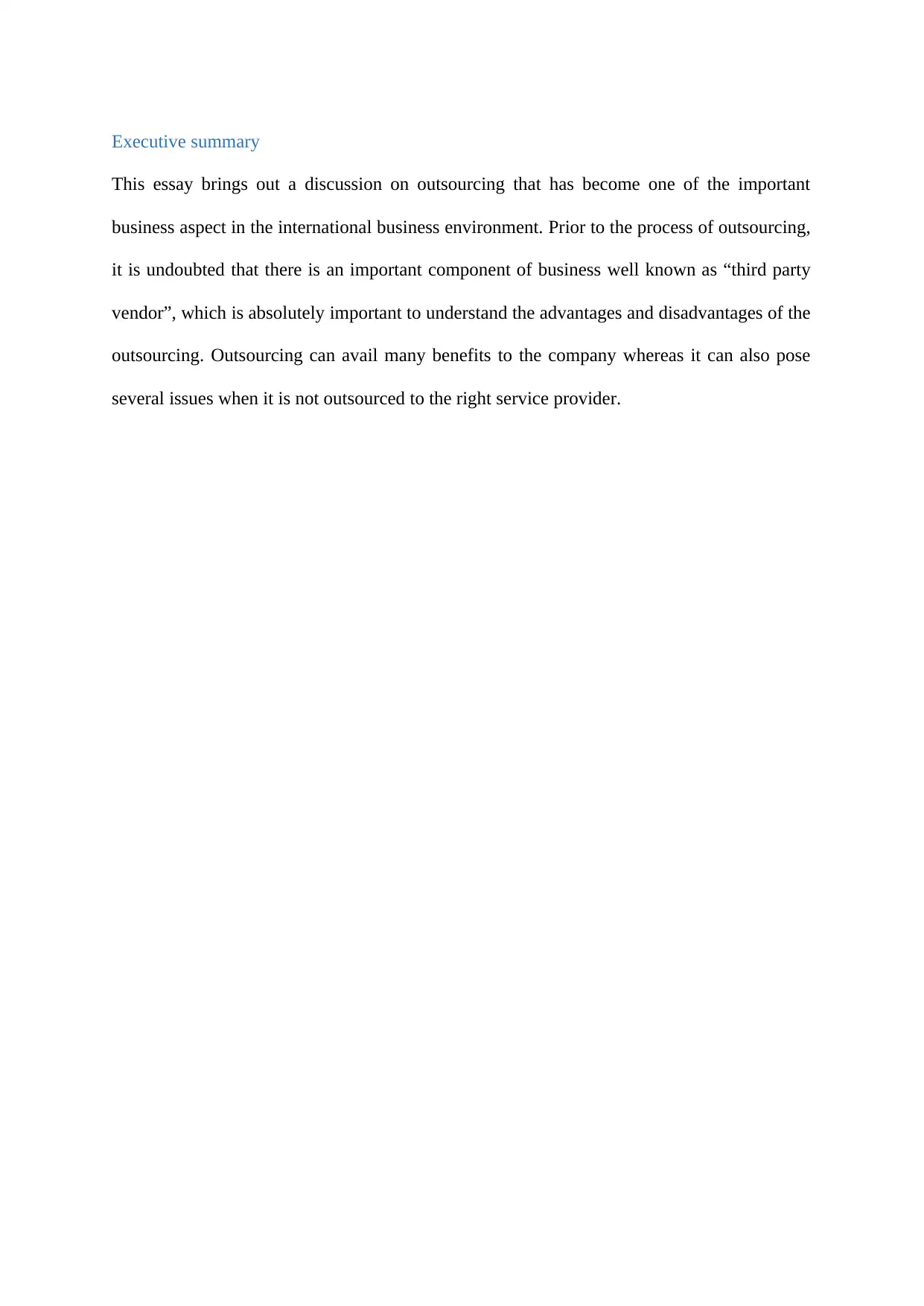
Executive summary
This essay brings out a discussion on outsourcing that has become one of the important
business aspect in the international business environment. Prior to the process of outsourcing,
it is undoubted that there is an important component of business well known as “third party
vendor”, which is absolutely important to understand the advantages and disadvantages of the
outsourcing. Outsourcing can avail many benefits to the company whereas it can also pose
several issues when it is not outsourced to the right service provider.
This essay brings out a discussion on outsourcing that has become one of the important
business aspect in the international business environment. Prior to the process of outsourcing,
it is undoubted that there is an important component of business well known as “third party
vendor”, which is absolutely important to understand the advantages and disadvantages of the
outsourcing. Outsourcing can avail many benefits to the company whereas it can also pose
several issues when it is not outsourced to the right service provider.

Contents
Executive summary...............................................................................................................................2
Introduction...........................................................................................................................................4
Advantages and disadvantages of outsourcing......................................................................................4
Conclusion.............................................................................................................................................7
References.............................................................................................................................................8
Executive summary...............................................................................................................................2
Introduction...........................................................................................................................................4
Advantages and disadvantages of outsourcing......................................................................................4
Conclusion.............................................................................................................................................7
References.............................................................................................................................................8
⊘ This is a preview!⊘
Do you want full access?
Subscribe today to unlock all pages.

Trusted by 1+ million students worldwide
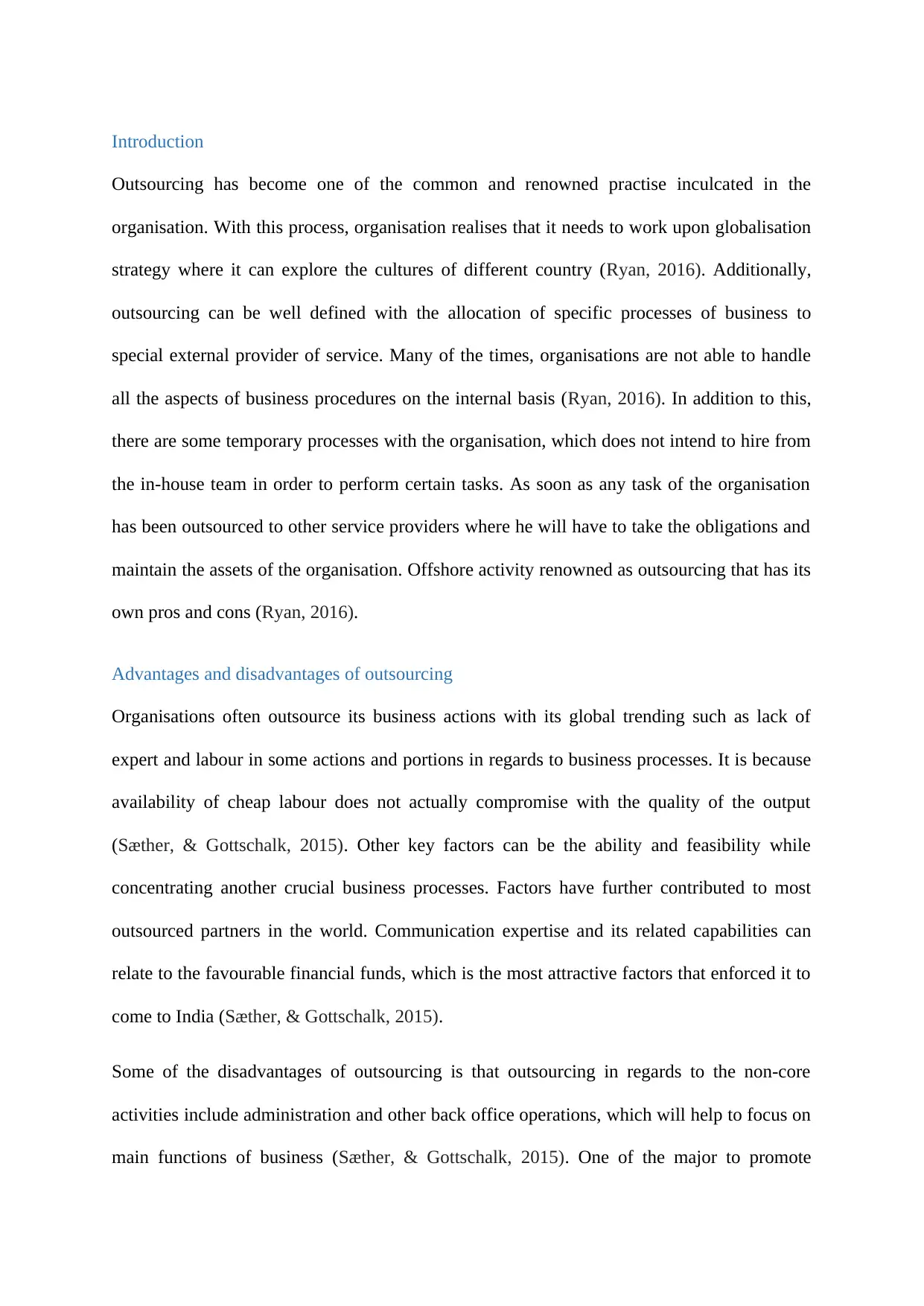
Introduction
Outsourcing has become one of the common and renowned practise inculcated in the
organisation. With this process, organisation realises that it needs to work upon globalisation
strategy where it can explore the cultures of different country (Ryan, 2016). Additionally,
outsourcing can be well defined with the allocation of specific processes of business to
special external provider of service. Many of the times, organisations are not able to handle
all the aspects of business procedures on the internal basis (Ryan, 2016). In addition to this,
there are some temporary processes with the organisation, which does not intend to hire from
the in-house team in order to perform certain tasks. As soon as any task of the organisation
has been outsourced to other service providers where he will have to take the obligations and
maintain the assets of the organisation. Offshore activity renowned as outsourcing that has its
own pros and cons (Ryan, 2016).
Advantages and disadvantages of outsourcing
Organisations often outsource its business actions with its global trending such as lack of
expert and labour in some actions and portions in regards to business processes. It is because
availability of cheap labour does not actually compromise with the quality of the output
(Sæther, & Gottschalk, 2015). Other key factors can be the ability and feasibility while
concentrating another crucial business processes. Factors have further contributed to most
outsourced partners in the world. Communication expertise and its related capabilities can
relate to the favourable financial funds, which is the most attractive factors that enforced it to
come to India (Sæther, & Gottschalk, 2015).
Some of the disadvantages of outsourcing is that outsourcing in regards to the non-core
activities include administration and other back office operations, which will help to focus on
main functions of business (Sæther, & Gottschalk, 2015). One of the major to promote
Outsourcing has become one of the common and renowned practise inculcated in the
organisation. With this process, organisation realises that it needs to work upon globalisation
strategy where it can explore the cultures of different country (Ryan, 2016). Additionally,
outsourcing can be well defined with the allocation of specific processes of business to
special external provider of service. Many of the times, organisations are not able to handle
all the aspects of business procedures on the internal basis (Ryan, 2016). In addition to this,
there are some temporary processes with the organisation, which does not intend to hire from
the in-house team in order to perform certain tasks. As soon as any task of the organisation
has been outsourced to other service providers where he will have to take the obligations and
maintain the assets of the organisation. Offshore activity renowned as outsourcing that has its
own pros and cons (Ryan, 2016).
Advantages and disadvantages of outsourcing
Organisations often outsource its business actions with its global trending such as lack of
expert and labour in some actions and portions in regards to business processes. It is because
availability of cheap labour does not actually compromise with the quality of the output
(Sæther, & Gottschalk, 2015). Other key factors can be the ability and feasibility while
concentrating another crucial business processes. Factors have further contributed to most
outsourced partners in the world. Communication expertise and its related capabilities can
relate to the favourable financial funds, which is the most attractive factors that enforced it to
come to India (Sæther, & Gottschalk, 2015).
Some of the disadvantages of outsourcing is that outsourcing in regards to the non-core
activities include administration and other back office operations, which will help to focus on
main functions of business (Sæther, & Gottschalk, 2015). One of the major to promote
Paraphrase This Document
Need a fresh take? Get an instant paraphrase of this document with our AI Paraphraser
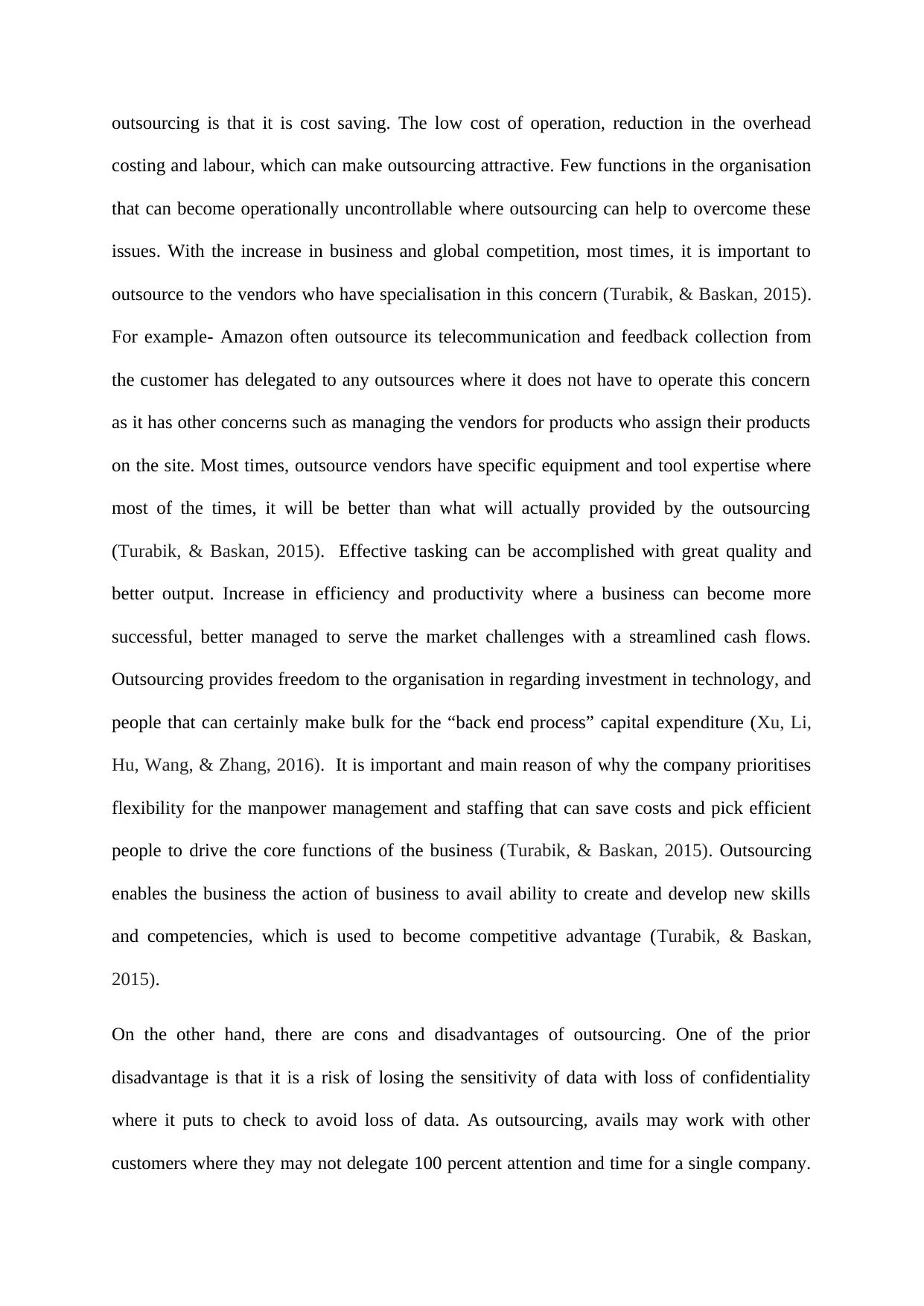
outsourcing is that it is cost saving. The low cost of operation, reduction in the overhead
costing and labour, which can make outsourcing attractive. Few functions in the organisation
that can become operationally uncontrollable where outsourcing can help to overcome these
issues. With the increase in business and global competition, most times, it is important to
outsource to the vendors who have specialisation in this concern (Turabik, & Baskan, 2015).
For example- Amazon often outsource its telecommunication and feedback collection from
the customer has delegated to any outsources where it does not have to operate this concern
as it has other concerns such as managing the vendors for products who assign their products
on the site. Most times, outsource vendors have specific equipment and tool expertise where
most of the times, it will be better than what will actually provided by the outsourcing
(Turabik, & Baskan, 2015). Effective tasking can be accomplished with great quality and
better output. Increase in efficiency and productivity where a business can become more
successful, better managed to serve the market challenges with a streamlined cash flows.
Outsourcing provides freedom to the organisation in regarding investment in technology, and
people that can certainly make bulk for the “back end process” capital expenditure (Xu, Li,
Hu, Wang, & Zhang, 2016). It is important and main reason of why the company prioritises
flexibility for the manpower management and staffing that can save costs and pick efficient
people to drive the core functions of the business (Turabik, & Baskan, 2015). Outsourcing
enables the business the action of business to avail ability to create and develop new skills
and competencies, which is used to become competitive advantage (Turabik, & Baskan,
2015).
On the other hand, there are cons and disadvantages of outsourcing. One of the prior
disadvantage is that it is a risk of losing the sensitivity of data with loss of confidentiality
where it puts to check to avoid loss of data. As outsourcing, avails may work with other
customers where they may not delegate 100 percent attention and time for a single company.
costing and labour, which can make outsourcing attractive. Few functions in the organisation
that can become operationally uncontrollable where outsourcing can help to overcome these
issues. With the increase in business and global competition, most times, it is important to
outsource to the vendors who have specialisation in this concern (Turabik, & Baskan, 2015).
For example- Amazon often outsource its telecommunication and feedback collection from
the customer has delegated to any outsources where it does not have to operate this concern
as it has other concerns such as managing the vendors for products who assign their products
on the site. Most times, outsource vendors have specific equipment and tool expertise where
most of the times, it will be better than what will actually provided by the outsourcing
(Turabik, & Baskan, 2015). Effective tasking can be accomplished with great quality and
better output. Increase in efficiency and productivity where a business can become more
successful, better managed to serve the market challenges with a streamlined cash flows.
Outsourcing provides freedom to the organisation in regarding investment in technology, and
people that can certainly make bulk for the “back end process” capital expenditure (Xu, Li,
Hu, Wang, & Zhang, 2016). It is important and main reason of why the company prioritises
flexibility for the manpower management and staffing that can save costs and pick efficient
people to drive the core functions of the business (Turabik, & Baskan, 2015). Outsourcing
enables the business the action of business to avail ability to create and develop new skills
and competencies, which is used to become competitive advantage (Turabik, & Baskan,
2015).
On the other hand, there are cons and disadvantages of outsourcing. One of the prior
disadvantage is that it is a risk of losing the sensitivity of data with loss of confidentiality
where it puts to check to avoid loss of data. As outsourcing, avails may work with other
customers where they may not delegate 100 percent attention and time for a single company.
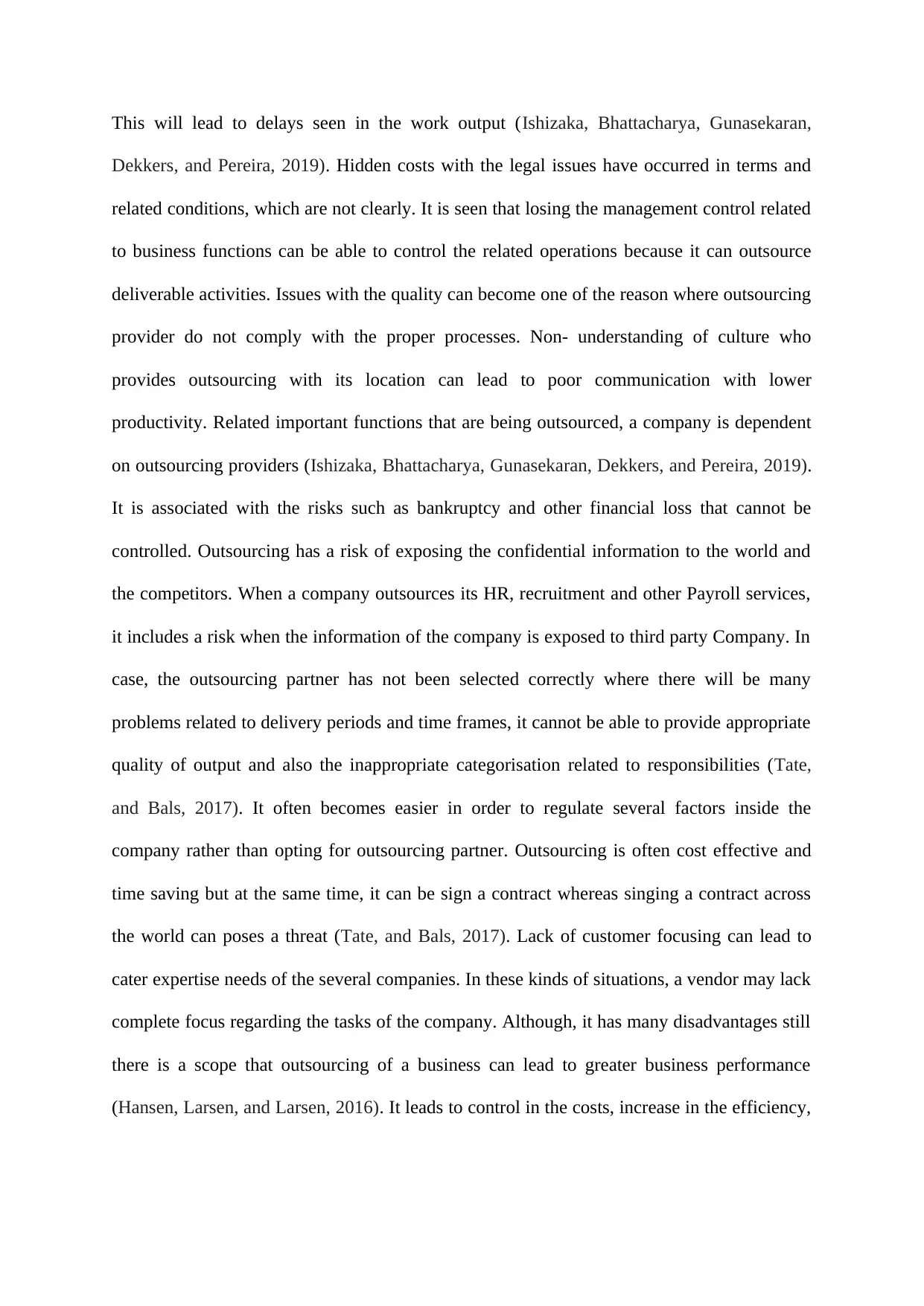
This will lead to delays seen in the work output (Ishizaka, Bhattacharya, Gunasekaran,
Dekkers, and Pereira, 2019). Hidden costs with the legal issues have occurred in terms and
related conditions, which are not clearly. It is seen that losing the management control related
to business functions can be able to control the related operations because it can outsource
deliverable activities. Issues with the quality can become one of the reason where outsourcing
provider do not comply with the proper processes. Non- understanding of culture who
provides outsourcing with its location can lead to poor communication with lower
productivity. Related important functions that are being outsourced, a company is dependent
on outsourcing providers (Ishizaka, Bhattacharya, Gunasekaran, Dekkers, and Pereira, 2019).
It is associated with the risks such as bankruptcy and other financial loss that cannot be
controlled. Outsourcing has a risk of exposing the confidential information to the world and
the competitors. When a company outsources its HR, recruitment and other Payroll services,
it includes a risk when the information of the company is exposed to third party Company. In
case, the outsourcing partner has not been selected correctly where there will be many
problems related to delivery periods and time frames, it cannot be able to provide appropriate
quality of output and also the inappropriate categorisation related to responsibilities (Tate,
and Bals, 2017). It often becomes easier in order to regulate several factors inside the
company rather than opting for outsourcing partner. Outsourcing is often cost effective and
time saving but at the same time, it can be sign a contract whereas singing a contract across
the world can poses a threat (Tate, and Bals, 2017). Lack of customer focusing can lead to
cater expertise needs of the several companies. In these kinds of situations, a vendor may lack
complete focus regarding the tasks of the company. Although, it has many disadvantages still
there is a scope that outsourcing of a business can lead to greater business performance
(Hansen, Larsen, and Larsen, 2016). It leads to control in the costs, increase in the efficiency,
Dekkers, and Pereira, 2019). Hidden costs with the legal issues have occurred in terms and
related conditions, which are not clearly. It is seen that losing the management control related
to business functions can be able to control the related operations because it can outsource
deliverable activities. Issues with the quality can become one of the reason where outsourcing
provider do not comply with the proper processes. Non- understanding of culture who
provides outsourcing with its location can lead to poor communication with lower
productivity. Related important functions that are being outsourced, a company is dependent
on outsourcing providers (Ishizaka, Bhattacharya, Gunasekaran, Dekkers, and Pereira, 2019).
It is associated with the risks such as bankruptcy and other financial loss that cannot be
controlled. Outsourcing has a risk of exposing the confidential information to the world and
the competitors. When a company outsources its HR, recruitment and other Payroll services,
it includes a risk when the information of the company is exposed to third party Company. In
case, the outsourcing partner has not been selected correctly where there will be many
problems related to delivery periods and time frames, it cannot be able to provide appropriate
quality of output and also the inappropriate categorisation related to responsibilities (Tate,
and Bals, 2017). It often becomes easier in order to regulate several factors inside the
company rather than opting for outsourcing partner. Outsourcing is often cost effective and
time saving but at the same time, it can be sign a contract whereas singing a contract across
the world can poses a threat (Tate, and Bals, 2017). Lack of customer focusing can lead to
cater expertise needs of the several companies. In these kinds of situations, a vendor may lack
complete focus regarding the tasks of the company. Although, it has many disadvantages still
there is a scope that outsourcing of a business can lead to greater business performance
(Hansen, Larsen, and Larsen, 2016). It leads to control in the costs, increase in the efficiency,
⊘ This is a preview!⊘
Do you want full access?
Subscribe today to unlock all pages.

Trusted by 1+ million students worldwide
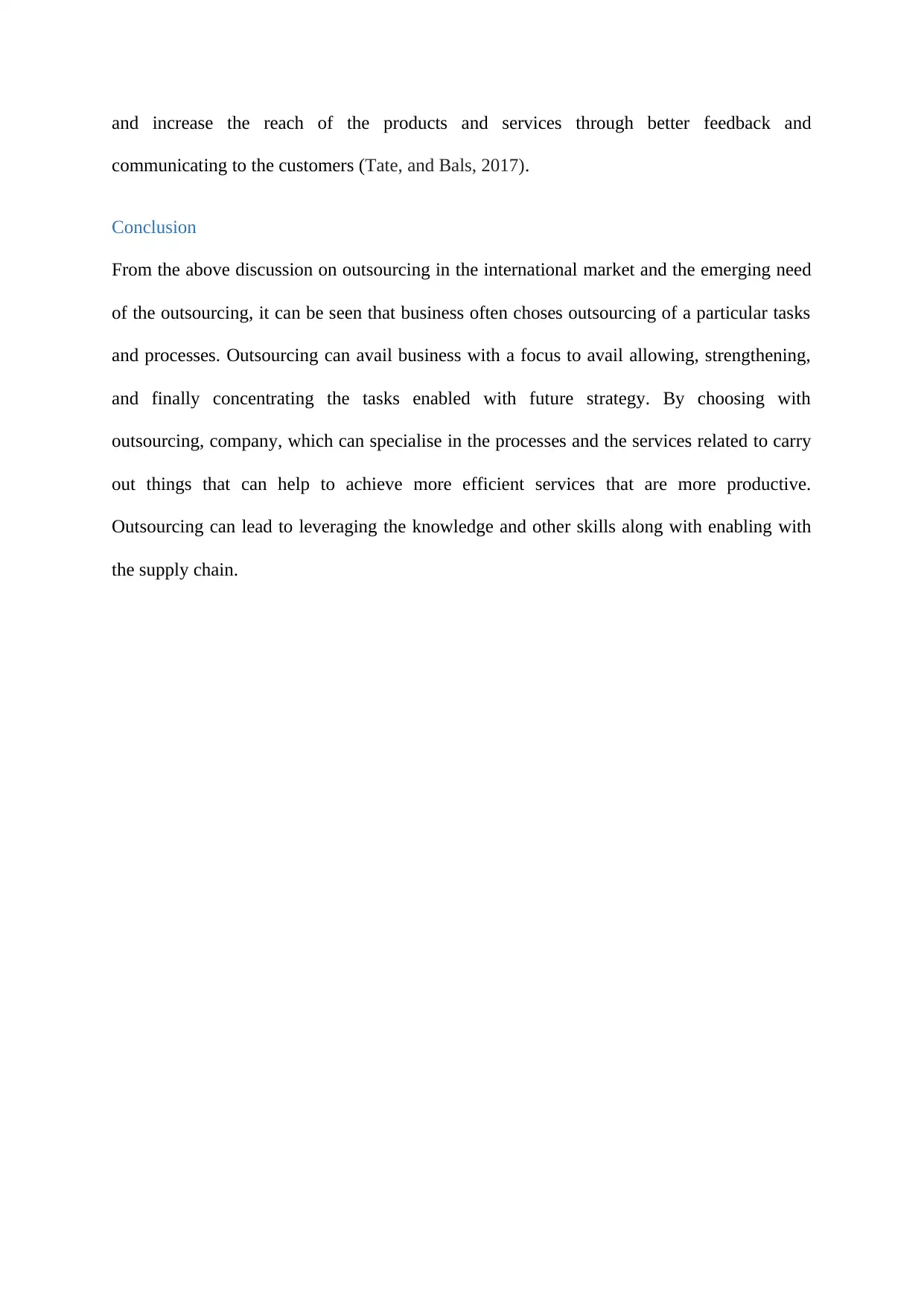
and increase the reach of the products and services through better feedback and
communicating to the customers (Tate, and Bals, 2017).
Conclusion
From the above discussion on outsourcing in the international market and the emerging need
of the outsourcing, it can be seen that business often choses outsourcing of a particular tasks
and processes. Outsourcing can avail business with a focus to avail allowing, strengthening,
and finally concentrating the tasks enabled with future strategy. By choosing with
outsourcing, company, which can specialise in the processes and the services related to carry
out things that can help to achieve more efficient services that are more productive.
Outsourcing can lead to leveraging the knowledge and other skills along with enabling with
the supply chain.
communicating to the customers (Tate, and Bals, 2017).
Conclusion
From the above discussion on outsourcing in the international market and the emerging need
of the outsourcing, it can be seen that business often choses outsourcing of a particular tasks
and processes. Outsourcing can avail business with a focus to avail allowing, strengthening,
and finally concentrating the tasks enabled with future strategy. By choosing with
outsourcing, company, which can specialise in the processes and the services related to carry
out things that can help to achieve more efficient services that are more productive.
Outsourcing can lead to leveraging the knowledge and other skills along with enabling with
the supply chain.
Paraphrase This Document
Need a fresh take? Get an instant paraphrase of this document with our AI Paraphraser
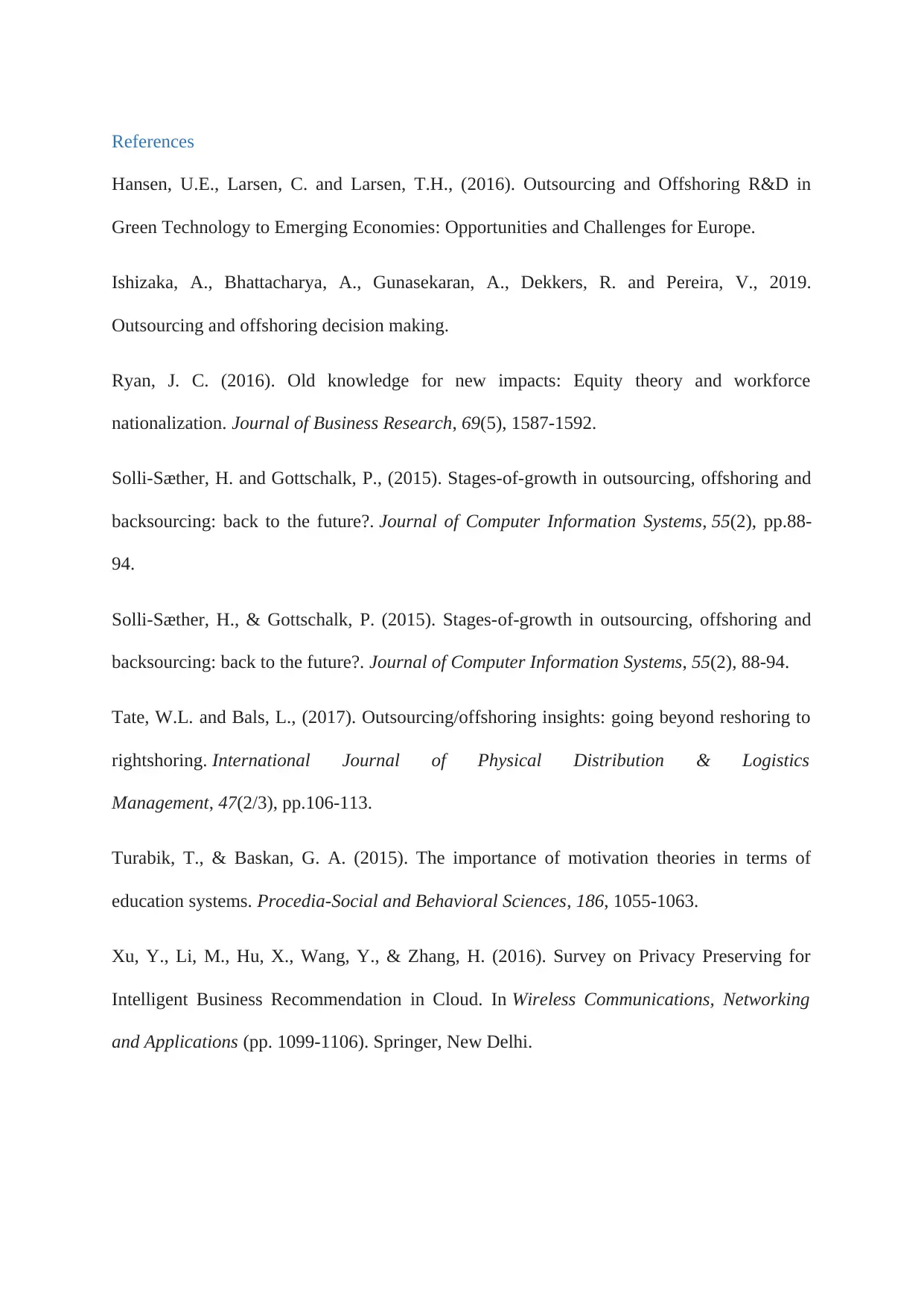
References
Hansen, U.E., Larsen, C. and Larsen, T.H., (2016). Outsourcing and Offshoring R&D in
Green Technology to Emerging Economies: Opportunities and Challenges for Europe.
Ishizaka, A., Bhattacharya, A., Gunasekaran, A., Dekkers, R. and Pereira, V., 2019.
Outsourcing and offshoring decision making.
Ryan, J. C. (2016). Old knowledge for new impacts: Equity theory and workforce
nationalization. Journal of Business Research, 69(5), 1587-1592.
Solli-Sæther, H. and Gottschalk, P., (2015). Stages-of-growth in outsourcing, offshoring and
backsourcing: back to the future?. Journal of Computer Information Systems, 55(2), pp.88-
94.
Solli-Sæther, H., & Gottschalk, P. (2015). Stages-of-growth in outsourcing, offshoring and
backsourcing: back to the future?. Journal of Computer Information Systems, 55(2), 88-94.
Tate, W.L. and Bals, L., (2017). Outsourcing/offshoring insights: going beyond reshoring to
rightshoring. International Journal of Physical Distribution & Logistics
Management, 47(2/3), pp.106-113.
Turabik, T., & Baskan, G. A. (2015). The importance of motivation theories in terms of
education systems. Procedia-Social and Behavioral Sciences, 186, 1055-1063.
Xu, Y., Li, M., Hu, X., Wang, Y., & Zhang, H. (2016). Survey on Privacy Preserving for
Intelligent Business Recommendation in Cloud. In Wireless Communications, Networking
and Applications (pp. 1099-1106). Springer, New Delhi.
Hansen, U.E., Larsen, C. and Larsen, T.H., (2016). Outsourcing and Offshoring R&D in
Green Technology to Emerging Economies: Opportunities and Challenges for Europe.
Ishizaka, A., Bhattacharya, A., Gunasekaran, A., Dekkers, R. and Pereira, V., 2019.
Outsourcing and offshoring decision making.
Ryan, J. C. (2016). Old knowledge for new impacts: Equity theory and workforce
nationalization. Journal of Business Research, 69(5), 1587-1592.
Solli-Sæther, H. and Gottschalk, P., (2015). Stages-of-growth in outsourcing, offshoring and
backsourcing: back to the future?. Journal of Computer Information Systems, 55(2), pp.88-
94.
Solli-Sæther, H., & Gottschalk, P. (2015). Stages-of-growth in outsourcing, offshoring and
backsourcing: back to the future?. Journal of Computer Information Systems, 55(2), 88-94.
Tate, W.L. and Bals, L., (2017). Outsourcing/offshoring insights: going beyond reshoring to
rightshoring. International Journal of Physical Distribution & Logistics
Management, 47(2/3), pp.106-113.
Turabik, T., & Baskan, G. A. (2015). The importance of motivation theories in terms of
education systems. Procedia-Social and Behavioral Sciences, 186, 1055-1063.
Xu, Y., Li, M., Hu, X., Wang, Y., & Zhang, H. (2016). Survey on Privacy Preserving for
Intelligent Business Recommendation in Cloud. In Wireless Communications, Networking
and Applications (pp. 1099-1106). Springer, New Delhi.
1 out of 8
Related Documents
Your All-in-One AI-Powered Toolkit for Academic Success.
+13062052269
info@desklib.com
Available 24*7 on WhatsApp / Email
![[object Object]](/_next/static/media/star-bottom.7253800d.svg)
Unlock your academic potential
Copyright © 2020–2026 A2Z Services. All Rights Reserved. Developed and managed by ZUCOL.





